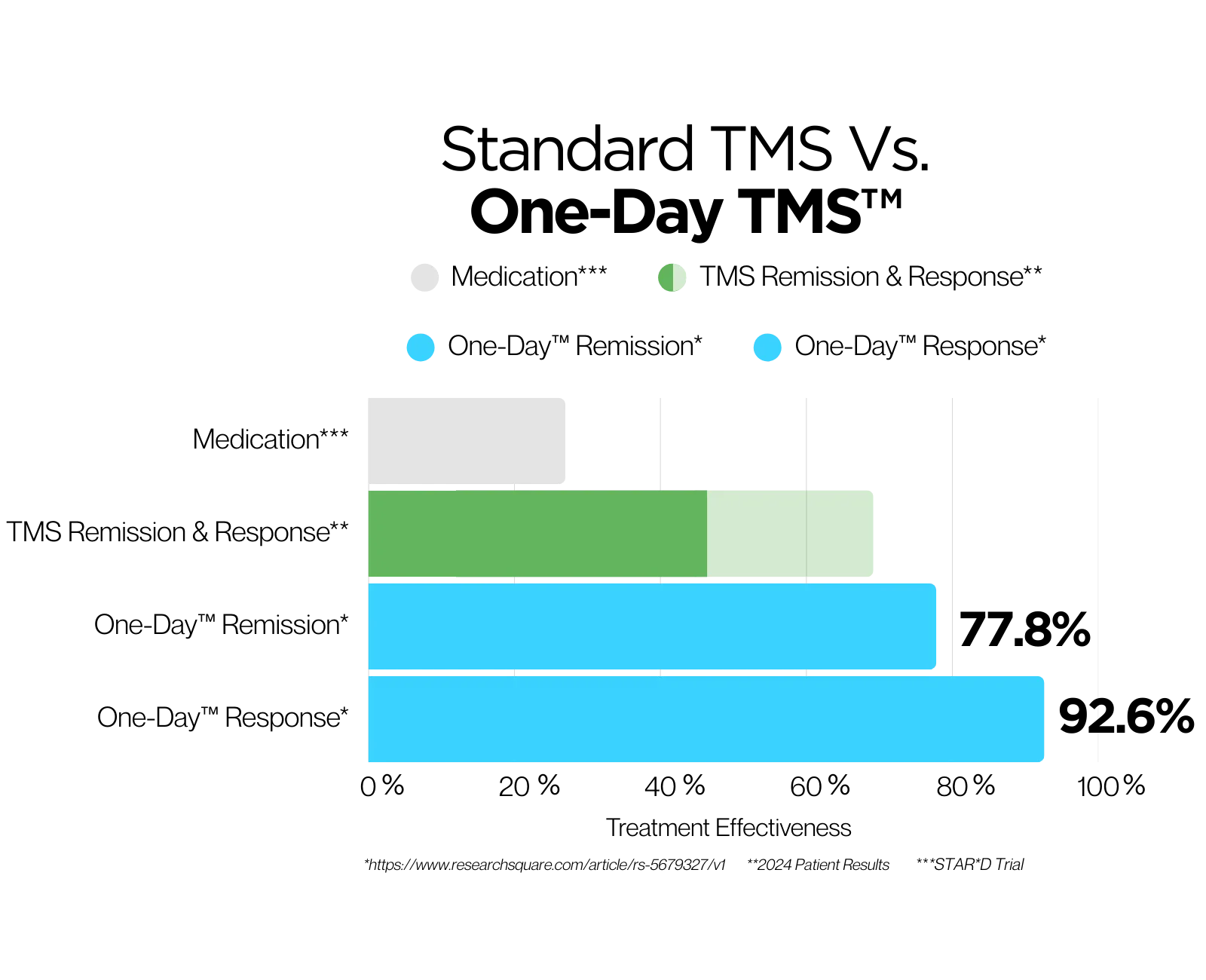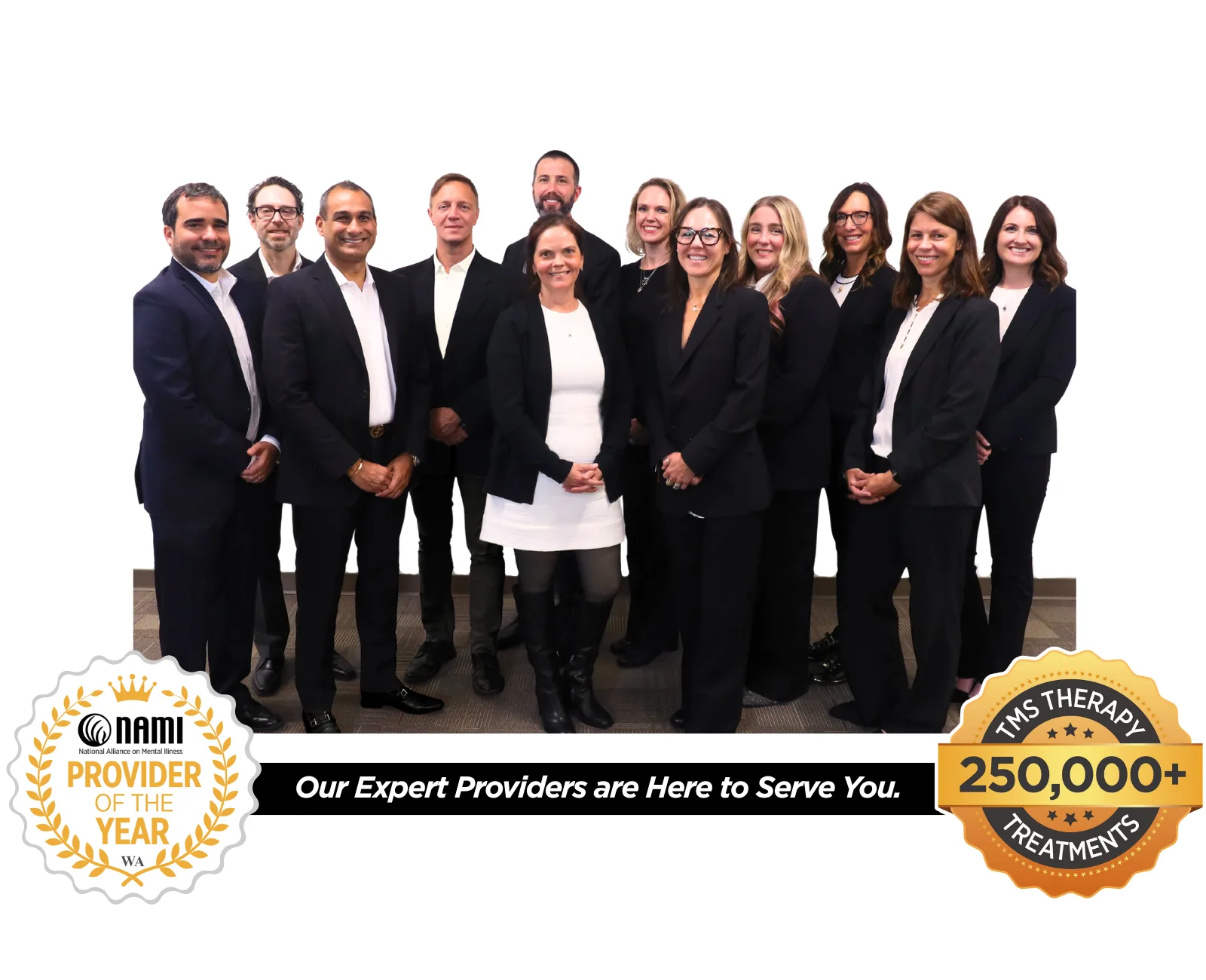Rapid Relief from Depression with
One-Day TMS™ Therapy
77.8%¹ Remission. Non-Invasive. Non-Sedative.
Evidence-based relief for depression
and anxiety — now in ONE-DAY.
Rapid Relief from Depression with
One-Day TMS™ Therapy
Evidence-based relief for depression and anxiety — now in ONE-DAY.
1
Day of Treatment
77.8%
Reach Remission¹
Sustained
Therapeutic Response

One-Day TMS™
A Groundbreaking Advancement in Mental Health
At NeuroStim TMS, we are transforming the landscape of mental health care using the latest advancements in Transcranial Magnetic Stimulation (TMS). We are the proud Pioneers of the One-Day TMS™ protocol, a scientifically validated, patient-centered approach designed to accelerate healing from depression, anxiety, and other mood disorders.
This off-label² protocol compresses the full therapeutic benefit of TMS Therapy into a single-day experience with unmatched speed, safety, and precision.
With 77.8% of patients reaching full remission from Major Depression — and 92.6% seeing significant symptom relief¹ — One-Day TMS™ is redefining what fast, effective TMS treatment looks like. This isn’t just innovation. It’s transformation.
What Makes Us Different?
-
Full Course of TMS Treatment — in One-Day
- Rapid Relief from Depression²
- Pioneers and Exclusive Providers of the One-Day TMS™ Protocol
- 92.6% Significant Symptom Improvement¹
- 77.8% Achieve Full Remission¹
- Performed by One-Day TMS™ Certified Specialists
- State-of-the-Art Treatment Facilities
Backed By Science.
Delivered by Experts.
Founded in 2017, and recognized as a leading national provider and research center, NeuroStim TMS has delivered 250,000+ TMS treatments across our 16 clinics.
Our One-Day TMS™ protocol is the product of a revolutionary clinical study (ONE-D) by a team of psychiatrists, neuroscientists, and TMS pioneers — including our own Medical Directors and Chief Medical Advisor.
This clinical study confirmed that intensive accelerated TMS administered in one day can produce expedited relief with sustained remission.²
Who Is One-Day TMS™ For?
One-Day TMS™ is an emerging treatment designed for patients with treatment-resistant depression (TRD), major depressive disorder (MDD), generalized anxiety disorder (GAD), and obsessive-compulsive disorder (OCD).
It is especially well suited for individuals who face barriers to traditional multi-week TMS regimens, including older adults, those with limited mobility, chronic medical conditions, or transportation challenges.
One-Day TMS™ offers a practical solution for people in rural or underserved areas, busy professionals, caregivers, or anyone unable to attend dozens of clinic visits for their standard TMS Treatment.²

How Did We Get Here?
Following FDA approval in 2008, Transcranial Magnetic Stimulation (TMS) quickly grew in both recognition and application as a safe and effective alternative for treating depression.
The standard 36-session course became widely adopted, offering impressive results compared to traditional pharmaceutical treatments. However, despite its success, the need to make this life-changing treatment accessible to more people remained clear.
As clinical outcomes and patient needs evolved, so too did the drive to explore accelerated protocols that could provide faster relief without compromising effectiveness. This commitment to advancing the field led to the development of more condensed treatment timelines, paving the way for protocols that offer similar, if not better outcomes, in a fraction of the time.²
1. One-Day TMS Treatment Details
The standard One-Day TMS™ Protocol is mirrored after the ONE-D Study (Optimized, Neuroplasticity-Enhanced Depression Treatment Regimen), an advanced TMS protocol that delivered 20 intermittent Theta Burst (iTBS) sessions over the course of a single day, combined with two supportive low-dose medications: D-cycloserine (DCS), an NMDA receptor partial agonist, and lisdexamfetamine (Vyvanse), a mild stimulant, both enhancing neuroplastic effects.
-
- In-Clinic Time Commitment: Patients typically spend approximately 9-10 hours in the clinic receiving their full course of TMS in a single day.
- Treatment Time Commitment: Each iTBS treatment lasts approximately 3-5 minutes, resulting in less than 2 hours of total treatment time. The iTBS protocol is an FDA-cleared stimulation pattern that applies short, high frequency bursts of magnetic pulses that are similar to the natural patterns of brain activity. ²
- Optimized Session Intervals: A 20-30 minute gap between treatment sessions maximizes neuroplasticity. This time gap provides the brain with the opportunity to process and consolidate the effects of stimulation, thereby increasing the therapeutic benefits.
- Personalized Targeting: Using scalp-based heuristics derived from causal network mapping enables precise stimulation of the targeted brain regions.
- Safety and Tolerability: All patients who completed the ONE-D regimen reported no serious side effects. As with traditional TMS Therapy, some patients experienced minor side effects such as transient headaches or scalp discomfort, which were managed with NSAIDs when needed. While early results suggest the safety profile is consistent with once-daily protocols, it’s important to note that the ONE-D regimen is a new protocol and ongoing observation will continue to inform its long-term safety.
- Delayed Onset of Effect: The ONE-D regimen showed a gradual improvement trajectory, with significant benefits emerging between weeks 1-6 post-treatment.
- Durability: Improvements were sustained at 12 weeks, with minimal relapse, with the ONE-D regimen. One patient experiencing partial relapse successfully responded to re-treatment.
2. Is it Safe?
Receiving more TMS sessions in a single day does not mean the treatment is more dangerous. Multiple well-designed studies — including a pivotal trial published in The American Journal of Psychiatry (Cole et al., 2020) — have shown that accelerated protocols, are generally safe, well-tolerated, and effective. The safety profile remains comparable to traditional, once-daily approaches.
3. Symptom Severity Doesn’t Dictate the Protocol
Accelerated TMS isn’t reserved only for patients with more “intense” or treatment-resistant symptoms. In fact, one-day treatment protocols often yield higher response rates compared to traditional 36-session courses, meaning all patients, not just those with more severe symptoms, could benefit from the opportunity of a higher likelihood of remission in a shorter period.
The choice of protocol is often more about logistics, access, and patient preference — not symptom intensity. All patients who qualify for TMS under standard clinical guidelines could potentially benefit from accelerated delivery, as it’s a safe and effective option for a broad range of individuals.
4. Accelerated TMS Is Not New or Experimental
The idea of “accelerated” or “faster” TMS is not experimental or fringe — it has been part of the field’s development for years. Leading academic centers and clinical practices have successfully implemented these protocols with positive outcomes. While newer to some community settings, it is well-supported in the literature and increasingly embraced across the industry.
5. We Are Not SAINT/SNT — and That’s Okay
It’s important to clarify that while our accelerated TMS protocol shares some surface-level similarities with the Stanford SAINT protocol, they are not the same — and that’s by design.
SAINT (Stanford Accelerated Intelligent Neuromodulation Therapy) is a highly specialized research protocol with unique features such as fMRI-guided targeting, ultra-high pulse dosing, and tightly controlled session timing over the course of five days. It’s an impressive advancement in a research setting — but not yet scalable or accessible for most clinical environments.
With SAINT’s success in achieving remission in just five days, researchers began exploring whether even shorter timelines were possible. But they quickly encountered a natural barrier: the brain tends to plateau. Beyond a certain number of sessions in a day, more stimulation wasn’t harmful — but it also didn’t lead to significantly better outcomes.
That’s where our protocol breaks new ground. By introducing neuroplasticity-enhancing medications, we help the brain remain receptive throughout the day — effectively overcoming the plateau and allowing for a more condensed, effective course of TMS. This integration allows us to safely reduce total treatment time while maintaining or even improving the brain’s response demonstrating higher response and remission rates.
While foundational accelerated pushed the science forward, we’re bringing that progress to patients in One-Day.
6. Cost & Coverage
One-Day TMS™ is a cash-pay treatment and is not covered by insurance. The full cost of treatment is $5,500. We are committed to making care accessible — reduced rates may be available for individuals with Medicare or Medicaid, military personnel, and households who qualify based on income levels.
Additionally, we believe travel should never be a barrier to healing. Patients traveling significant distances may be eligible for travel assistance. Please contact us to learn more about available financial support.
¹ONE-D Study Results ²While standard TMS Therapy is FDA-Approved and covered by most insurance companies, some accelerated TMS protocols and devices are considered off-label, including One-Day TMS. Our expert team can help review coverage and payment options during your consultation.
Ready to Experience Life-Changing Relief — In Just One-Day?
Don’t let depression, anxiety, or OCD hold you back any longer. With NeuroStim’s exclusive One-Day TMS™ Protocol, you can take the first step toward lasting recovery — safely, effectively, and without the wait.
Take control of your mental health today. Schedule your free consultation, or call us directly at (253) 900-4244 to speak with a One-Day TMS™ Specialist.
Ready to Experience
Life-Changing Relief
— In Just One Day?
Don’t let depression, anxiety, or OCD hold you back any longer. With NeuroStim’s exclusive One-Day TMS™ Protocol, you can take the first step toward lasting recovery — safely, effectively, and without the wait.
Take control of your mental health today. Schedule your free consultation, or call us directly at (253) 900-4244 to speak with a One-Day TMS™ Specialist.
